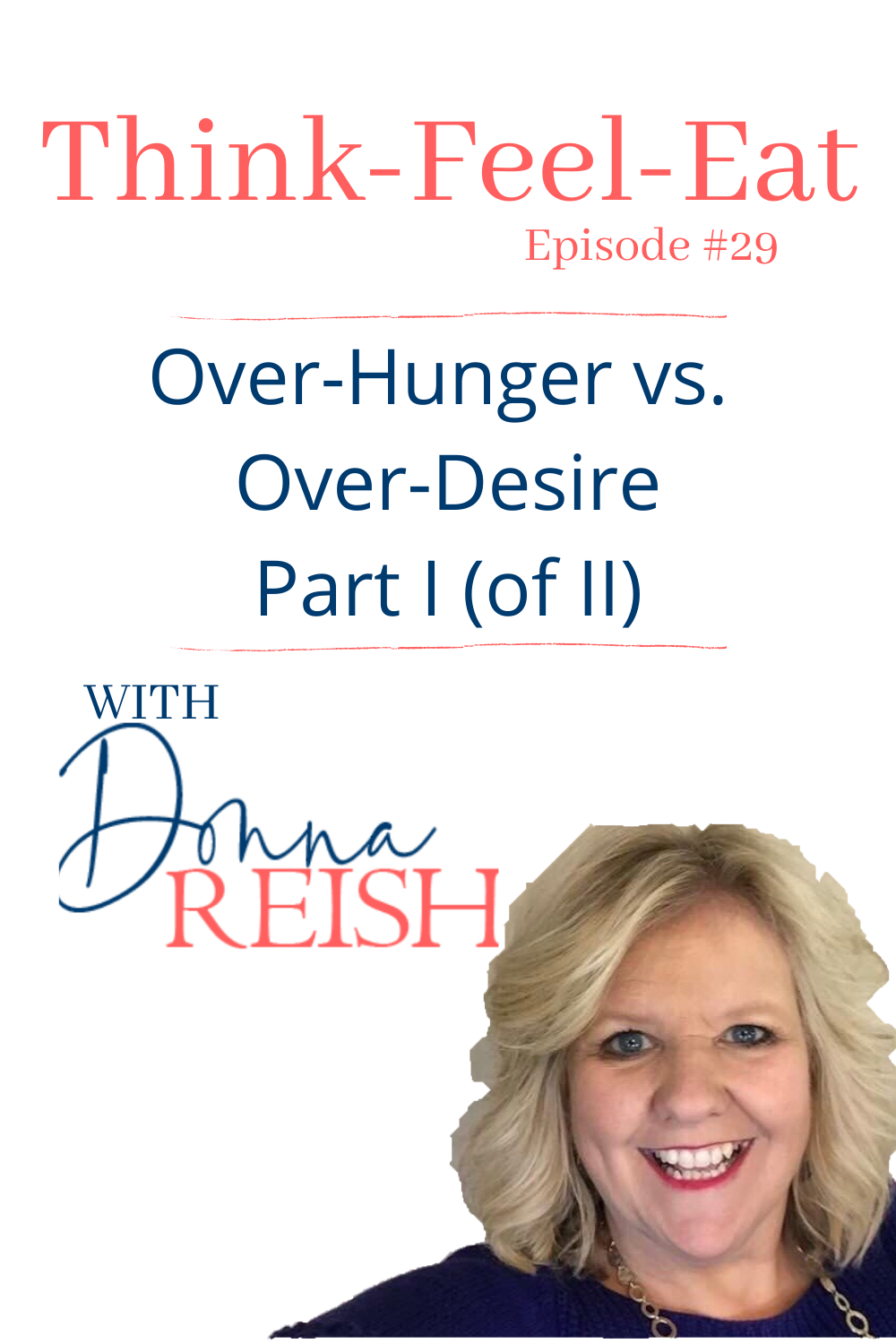Hi! I’m Donna Reish, IF teacher, weight loss coach, blogger, and half of “The Minus 220 Pound Pair” as my husband and I have lost over 220 pounds together (160 of that in the past couple of years through the Weight Loss Lifestyle habits and strategies I teach!).
In this episode, I present the first of two episodes about Over-Hunger and Over-Desire.
Most of us who have battled with excess weight our entire lives understand that eating too much leads to being overweight. What we often do not fully understand is what causes us to overeat. (I’ve described many aspects of what causes us to overeat in TFE episodes found at donnareish.com/perfectstorm)
There are two over-arching causes of over-eating: over-hunger and over-desire. We often get the two confused, and we often think they are one in the same.
In this two part series, I explain the differences and similarities of the two—and how we can take some steps to counteract both of them.
In this episode, I focus primarily on over-hunger (after a brief introduction to both of them).
Over-hunger is any time we experience hunger that causes us to exceed the amount of food our bodies need at our current weight. (Or when we can’t control our hunger while we are attempting to eat at a lower weight/goal weight.)
Hunger is controlled, in large part, by a hormone called ghrelin. I describe what ghrelin is, how is released, its part in our hunger (and somewhat in satiety), and more.
Then I move into ways we can counteract hunger. There is a long list of these, but one of these is Intermittent Fasting. I describe how we can actually train hunger through a daily time of no food at all and a shorter time in which we eat.
Join me next week as we look at over-desire—and then we learn the things that affect both of these (since there are some overlapping elements).
Think Feel Eat #29: Over-Hunger vs. Over-Desire (I of II)
I. Over-hunger vs Over-desire
A. Differences
1. Over-hunger is when we have true stomach hunger—the “growling ghrelin gremlins” are telling us our food is low. (See later.)
a. At end of our fast
b. When we eat a small amount when we open our eating window and then have hunger soon after.
c. When we haven’t regulated hunger during the fast yet.
d. When we haven’t figured out our best fasting time and we can’t sleep at night because of hunger.
2. Over-desire is when we desire food, often without hunger and usually certain types of food.
a. Has nothing to do with hunger.
b. Can eat these desired foods even if we are full.
c. Usually created by giving in to cravings so frequently or by not controlling seductive foods.
d. Not as affected by fasting as hunger is.
3. Each one affects a different part
a. Over-hunger is affected by satiation—when we are not sated or satiated (i.e. full), we can have more hunger
b. Over-desire is affected by satisfaction—when we are not satisfied with our food choices, we have more desire for certain foods
B. Similarities
1. They both cause the same final outcome: over-eating resulting in weight gain.
2. They can both be controlled quite a bit through strategic actions. (See The Perfect Storm of Weight Loss!)
II. Over-Hunger
A. Growling Ghrelin Gremlins
1. What is Ghrelin?
a. Hormone produced in/released from the gut (and also in smaller amounts from the pancreas and brain)
b. It controls appetite!
c. When stomach is empty, ghrelin is released to tell you that you are hungry
d. Stomach growling is associated with ghrelin
e. Also has roles in growth hormones, insulin secretion, GI motility, blood pressure, and more
2. When is it released?
a. Low blood sugar, low weight (i.e. needing to gain weight), and fasting (or long time since last meal) all cause ghrelin to be released
b. Stomach distension—or food in the stomach—can cause ghrelin to NOT be released
c. Sometimes ghrelin overrides stomach distension!
d. Rises before meals and falls after meals
e. Very sensitive to food intake, so it is increased with dieting
f. Also released in response to stress—which is why people overeat when stressed (and can become a vicious cycle that is hard to stop)
g. Released at typical meal times—clock hunger
h. Released about three hours after last meal (waves of hunger)
i. Not released more and more as time goes on
j. Ghrelin is low in the mornings, so fasting will likely be easier in the mornings than the evenings
B. How can we control hunger?
1. Water—fill that stomach up!
2. Sparkling water/carbonation—bubbles trick ghrelin into thinking we are putting food in it (some have opposite effect with sparkling water)
3. Stomach distensibility—as we shrink our stomach, it will be smaller and less ghrelin will be released
4. Fill stomach with the recommended 6 cups of veggies at or near the beginning of eating window! 3 F’s—fluidy, fluffy, and fibrous
5. Don’t overly restrict calories (increases ghrelin automatically)
6. Eat more fiber (again, filling up the stomach)
7. Eat more protein—research shows it is a satiating macro, empties from stomach over longer period of time, and prolongs feelings of fullness
8. HIIT exercises help manage it
9. Exercise fasted—shown to regulate appetite more than later in the day
10. Sleep—seriously, it helps all hormones level out! 7-9 hours is a good number to shoot for
11. Reduce or control stress (mediation, prayer, journaling, yoga)
12. Eat more real foods—feedback to ghrelin doesn’t work as well with processed foods
13. Since it comes in waves that last about ten minutes, you can time them and watch them disappear with the time!
14. Fast!
i. Eventually, you will solve the hunger problem for at least 15-18 hours a day!
ii. You won’t need to use willpower for hunger!
15. Over-hunger and macro-nutrients+
i. Protein most satiating macronutrient
ii. Fat next to the most
iii. Carbs least—but quick energy
C. Steps
1. Intermittent Fasting Course—first Monday of each month; use code SAVE20 to get $20 off– see you in September!













